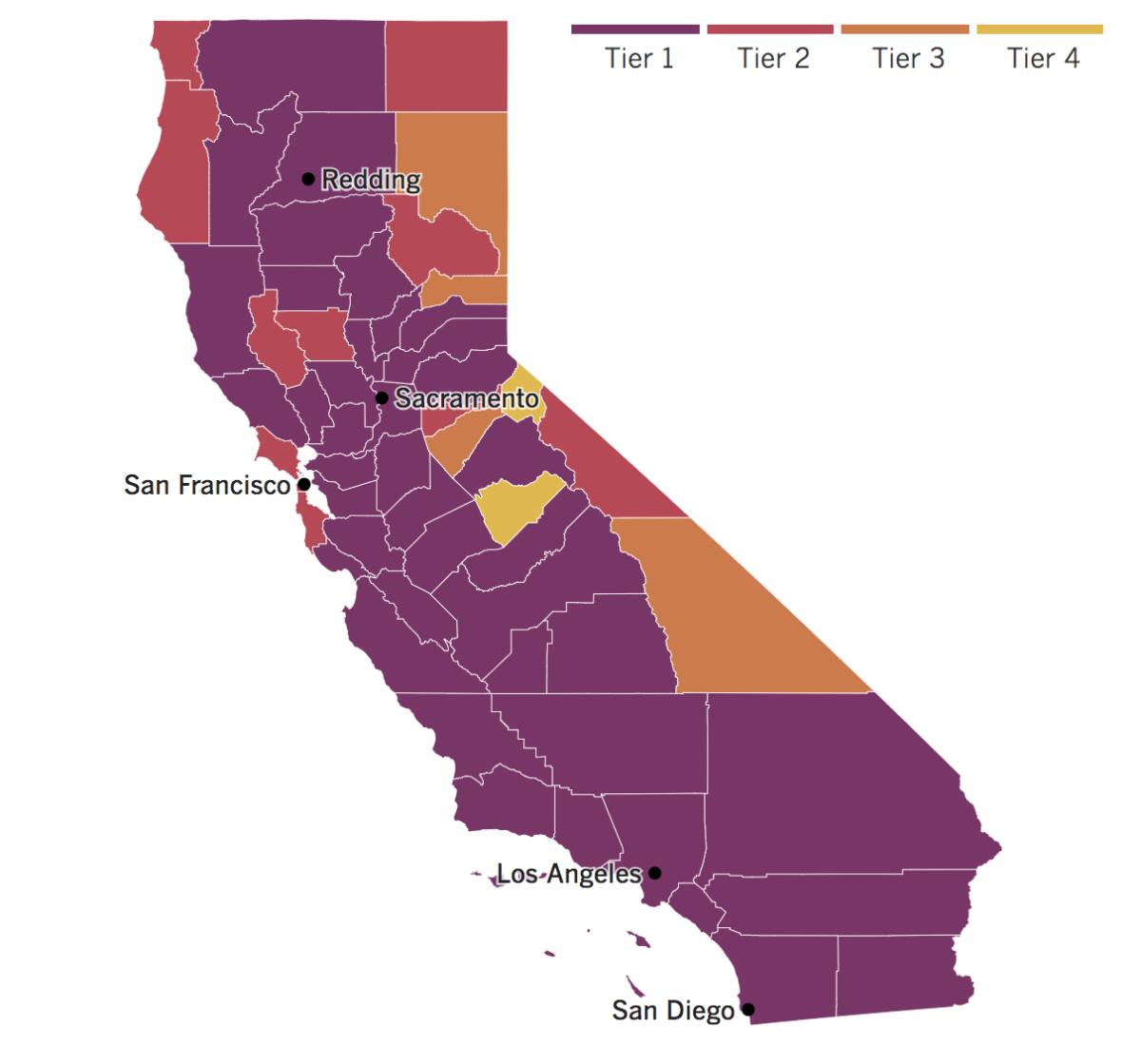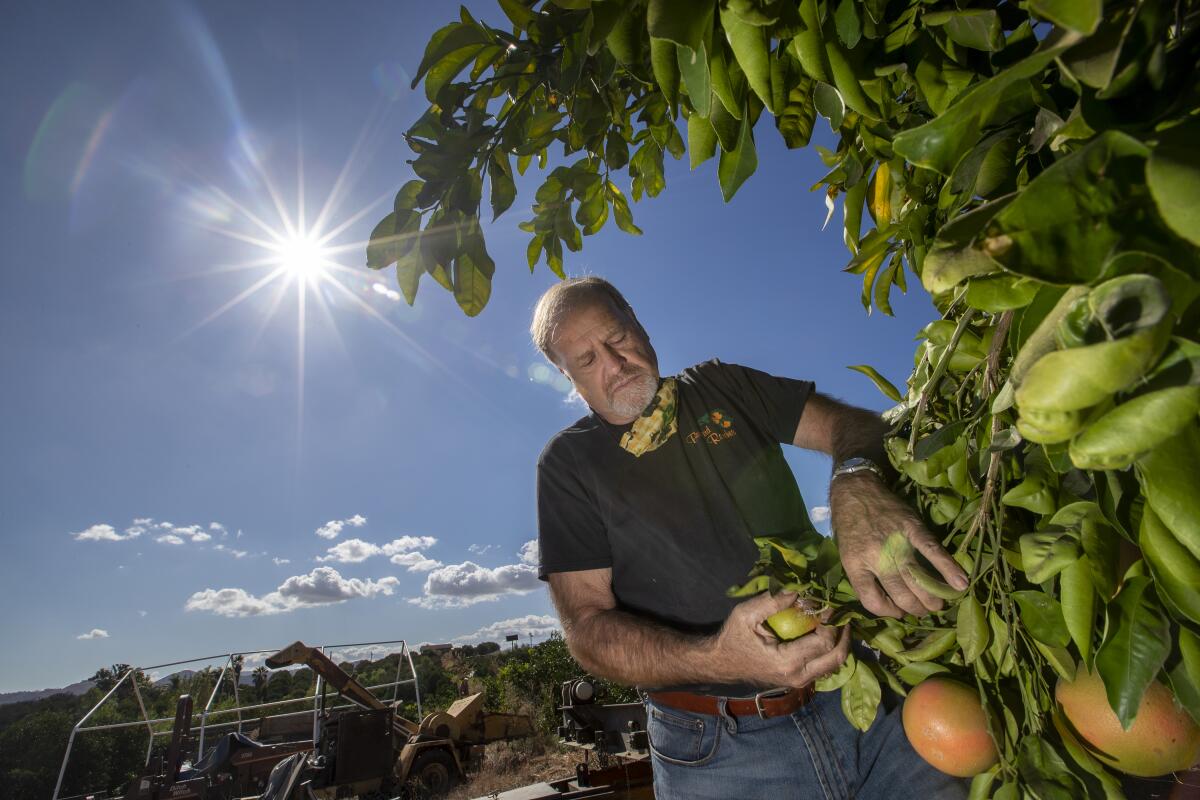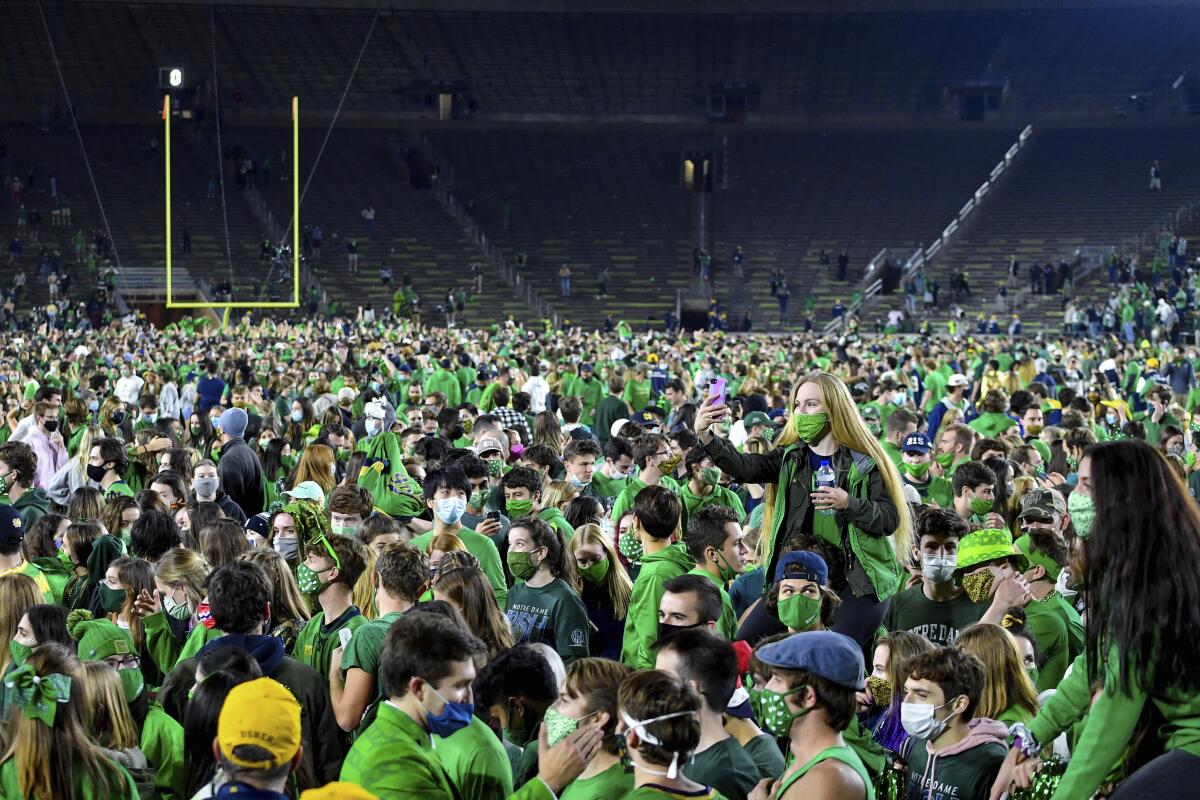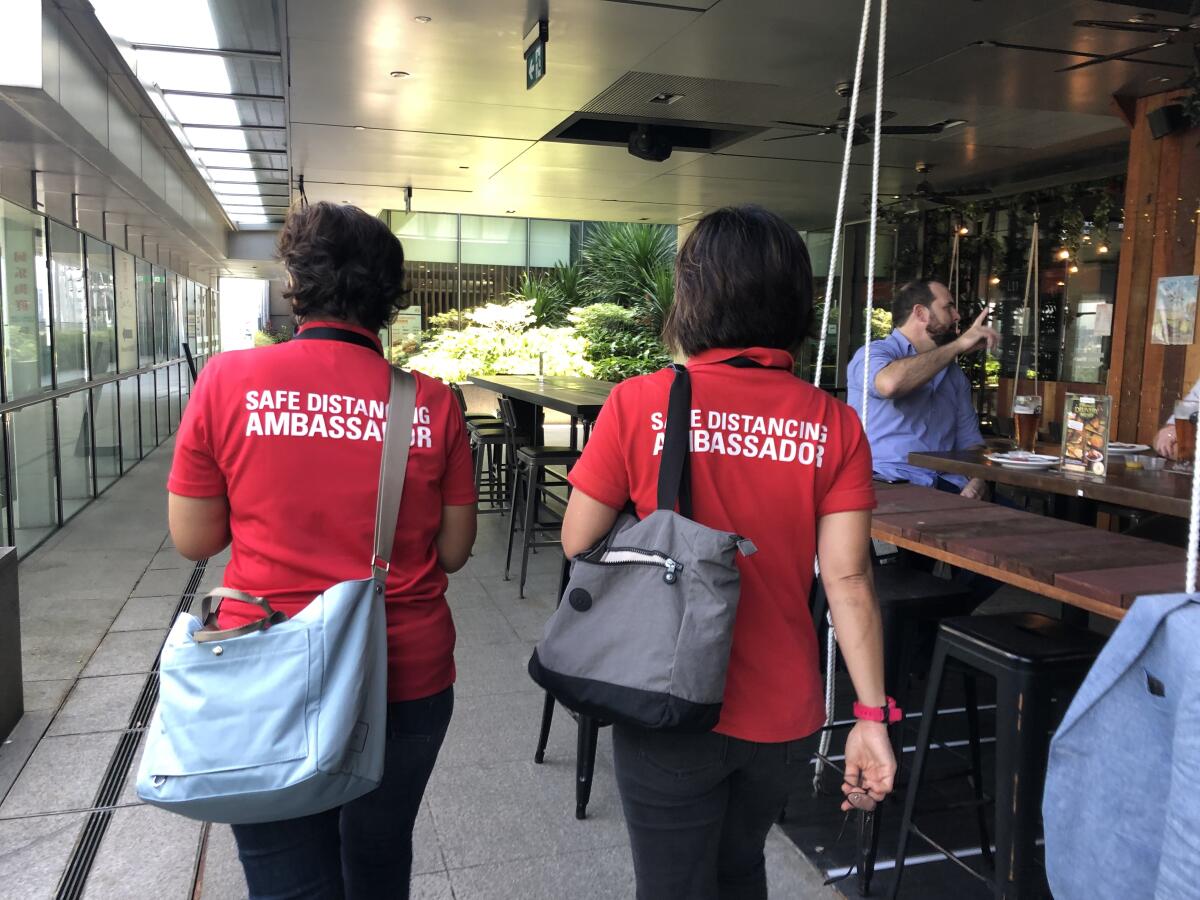Coronavirus Today: It’s Thanksgiving decision time
Good evening. I’m Amina Khan, and it’s Friday, Nov. 20. Here’s the latest on what’s happening with the coronavirus, plus ways to spend your weekend and a look at some of the week’s best stories.
Well, folks, the time is nigh. It’s the weekend before Thanksgiving, and many among us have canceled long-awaited travel plans to see friends and family who’ve been sorely missed over the course of the COVID-19 pandemic.
For those of us still thinking about traveling, the Centers for Disease Control and Prevention has one word of advice: Don’t.
OK, so there are a few more words involved. But the sentiment remains the same. Just stay put.
“The safest way to celebrate Thanksgiving this year is at home with the people in your household,” said Erin Sauber-Schatz, who leads the CDC’s Community Intervention and Critical Population Task Force.
Previously, federal officials had declined to give firm guidance for holiday gatherings, leaving it to Americans to decide for themselves whether to risk getting infected.
But things have changed. The White House, which has long downplayed the risks posed by the pandemic, said this week that President Trump would stay in Washington for Thanksgiving instead of traveling to his resort in Florida, though it didn’t give a reason for the change in plans. Health and Human Services Secretary Alex Azar also urged Americans to celebrate only with their immediate household.
Many in California have been taking coronavirus tests in advance of travel or group events, thinking that a negative result will give them a green light to get together. (That’s also been true across the United States, leading to a shortage in testing supplies.) Public health officials across the state say that’s a bad idea, because this tactic doesn’t work.
“We have seen the repeated failure of this type of testing strategy across the country, including in Washington, D.C.,” said Dr. Grant Colfax, San Francisco’s director of health. “A negative test cannot be an excuse to put yourself or others at risk.”
That’s because a person who tests negative can still be carrying the virus if they were tested early in their infection, health officials say.
Testing “is an identifier at that moment,” said Los Angeles County public health officer Dr. Muntu Davis. It’s not a preventative measure, and it’s not a barometer for future illness, he added.
Keep in mind that people are typically infectious well before they start to show symptoms. So a person could test negative and then spread the virus to their friends and loved ones before they’re aware that they’re infected.
Angelenos may want to consider that L.A. County began a limited curfew today that prohibits all gatherings with members of other households and all activities outside of the place you’re living from 10 p.m. to 5 a.m. You can find more key details here.
That curfew was triggered by a local surge in cases that shows no signs of slowing down. The county added a whopping 4,943 new cases on Thursday, helping vault the statewide daily total to a record-breaking 13,422 new cases. If a tally like that is repeated Friday, Saturday and Sunday, the county would likely need to return to a stay-at-home order, according a framework laid out earlier this week.
For those Southlanders who are making the hard decision to pull the plug on Thanksgiving plans, here’s an update on which local activities are open and which are closed under current pandemic restrictions. (Some highlights: Outdoor museums and gardens are open, as are some art galleries that have certain safety precautions in place. You can also catch a drive-through opera or dance performance.)
And for the introverts among us — and maybe for all of us, whatever our personality type — Arielle Paul finds reason to be thankful that the traditional turkey-stravaganza will look different this year.
By the numbers
California cases and deaths as of 4:12 p.m. PST:

Track the latest numbers and how they break down in California with our graphics.
See the current status of California’s reopening, county by county, with our tracker.


What to read this weekend
A season of disappointment: Business is down for many California restaurants and shop owners. But for folks like Maria Mir, it’s booming. That’s because Mir, a licensed and family therapist, is seeing a surge in people who are lonely, isolated and financially struggling over this pandemic holiday season.
Thanksgiving and Christmas blues are usually par for the course, Mir says, but “this particular time is different.” People are separated from their extended families. They may not have money to buy those loved ones gifts. University campuses are largely on lockdown, leaving college students studying from home. “Even people who haven’t felt lonely in the past are now feeling that isolation.”
My colleagues Maria La Ganga, Sonja Sharp and Julia Barajas gathered this and other dispatches from Californians dealing with a uniquely challenging holiday season.
Why we’ll always love Dolly: If you need a bit of a pick-me-up after the excellent but sobering story above, here’s a rare bit of 2020 good news: Dolly Parton has helped make a COVID-19 vaccine a reality. A recent report in the New England Journal of Medicine identified the country music legend as a financial sponsor of Moderna’s COVID-19 vaccine after she donated $1 million to Vanderbilt University’s coronavirus research fund earlier this year. Some of that money went to Moderna.
The pioneering singer, songwriter and actress hadn’t even realized this new line had been added to her long and distinguished resume. “Yeah, that’s what I understand this morning,” she said on NBC’s “Today” this week when asked about the buzz surrounding her donation. “I’m just happy that anything I do can help somebody else, and when I donated the money to the COVID fund, I just wanted it to do good, and evidently it is. Let’s just hope we find a cure real soon.”
Family farms are wilting: California’s small family farms are doing their best to fight through dried-up sales and spiking bills during the pandemic, and they’re having to make some gut-wrenching choices. My colleague Lucas Kwan Peterson talked to an array of professional green thumbs around the region, including Vince Bernard, who is being forced to consider pulling out some of his citrus trees because he can’t afford the water bill to keep all of them alive.
Sacrificing trees is like “cutting your arm off,” said Bernard, who grows navel oranges, Valencias, limes, lemons and avocados over 50 acres. “I can’t turn the water off from the trees and watch them suffer,” he said. “But I can call someone up and say, ‘Bulldoze this 5 acres’” — perhaps a more merciful end for his beloved trees. “I come out and say a prayer. They’re gone.”

Face mask fail? The first — and only — randomized clinical trial designed to test the infection-fighting power of face masks was a bust. The study, conducted in Denmark, concluded that volunteers who were assigned to wear face masks contracted the coronavirus at roughly the same rate as volunteers who remained mask-free.
Instead of declaring them a failure, however, the investigators went the other way. The problem, they said, wasn’t with the masks. The problem was that people didn’t use masks enough. “Masks likely need to be worn by most if not all people to reduce community infection rates,” argued the editors of the medical journal that published the study. “The results of this trial should motivate widespread mask wearing to protect our communities and thereby ourselves.”
Read the full story by my colleague Karen Kaplan to see why advocates for universal mask use declared victory in the face of this apparent defeat.
The silver research lining to a COVID-19 cloud: When Notre Dame’s football team staged an improbable comeback against top-ranked Clemson, fans in the stadium abandoned their seats and stormed the field. All that crowding, hugging and high-fiving was a public-health nightmare, officials said — the kind of activity that could allow the coronavirus to easily infect masses of people. It could have been a super-spreading event broadcast on live TV.
“It made me nervous, for sure,” said Dr. David Eisenman, director of UCLA’s Center for Public Health and Disasters, who saw clips of the event on television.
While the celebration was a less than ideal public health situation — despite being vigorously defended by some Irish fans — it could offer a fascinating window into the dynamics of coronavirus transmission in mass outdoor settings, my colleague David Wharton writes. Researchers will be watching.

L.A. Affairs: It’s no secret that the pandemic has been tough on single folks. Zoom video calls and virtual dating make picking up on red flags even trickier.
But attorney Yonit Kovnator seems to have inadvertently found a useful tool in the mask, which filters out bad matches almost as well as it filters out the virus. A key point comes when a date who agrees to wear a mask shows up at a public park with it hanging below his nose. I’ll let you guess how that guy works out, or you can read the whole story yourself.
Your support helps us deliver the news that matters most.
What to do this weekend
Get outside. Walk Wilshire Boulevard from end to end with members of the Sierra Club (social distancing will be enforced). Or create your own turkey trot. Subscribe to The Wild for more on the outdoors.
Go for a drive. Head out to Camarillo, where you can lounge in your car and watch a COVID-themed opera inspired by Mozart’s “Così fan Tutte.” Or drive 80 miles east of downtown L.A. to Oak Glen for an apple butter festival, where you can also check out corn milling, cider pressing and other artisan trades. Subscribe to Escapes for more California travel ideas.
Watch something great. Our weekend culture watch list features Alan Cumming, Constance Wu, Ellen Burstyn and Samira Wiley in a virtual staging of “Uncle Vanya,” an adaptation of Chekhov’s classic 19th-century Russian domestic drama. And in his Indie Focus newsletter’s roundup of new movies, Mark Olsen highlights “Sound of Metal,” an “intense, immersive tale” about a young rock drummer and recovering drug addict who suddenly loses his ability to hear.
Eat something great. Get a head start on Thanksgiving prep by cooking some of The Times’ genre-bending twists on holiday classics, such as a butter-crisped turkey, cranberry-clementine membrillo and, of course, the previously featured Pumpkin Nemesis. Sign up for our Cooking newsletter for more great recipes.
Go online. Here’s The Times’ guide to the internet for when you’re looking for information on self-care, feel like learning something new or interesting, or want to expand your entertainment horizons.
Resources
— For general safety, wash your hands for at least 20 seconds (here’s a super-fun how-to video). Stop touching your face, and keep your phone clean. Practice social distancing, maintaining a six-foot radius of personal space in public. And wear a mask if you leave home. Here’s how to do it right.
— Watch for symptoms including fever, cough, shortness of breath, chills, repeated shaking with chills, muscle pain, headache, sore throat and loss of taste or smell. If you’re worried you might be infected, call your doctor or urgent care clinic before going there.
— Need a COVID-19 test? Here’s how to receive a free test if you’re in L.A. County. And here’s a map of testing sites across California.
— Here’s how to care for someone with COVID-19, from monitoring their symptoms to preventing the virus’ spread.
— If your job has been affected by the pandemic, here’s how to file for unemployment.
— Here are some free resources for restaurant workers and entertainment industry professionals having trouble making ends meet.
— Advice for helping kids navigate pandemic life includes being honest about uncertainties, acknowledging their feelings and sticking to a routine. Here’s guidance from the CDC.
— In need of mental health services? Here are resources for coping during the crisis from the CDC and the L.A. County Department of Mental Health. L.A. County residents can also call (800) 854-7771 or text “LA” to 741741.
— For domestic violence victims, the pandemic can pose a “worst-case scenario,” advocates say. If you or someone you know is experiencing such abuse, call the National Domestic Violence Hotline at 1-800-799-SAFE (7233) or L.A. County’s hotline at 1-800-978-3600. Here are more ways to get help.The pandemic in pictures

Some heroes wear capes. Others don red polo shirts emblazoned with the words “Safe Distancing Ambassador.”
From my colleague David Pierson comes the story of the Red Ants, Singapore’s on-the-ground line of defense against the publicly unmasked and violators of social-distancing policy. These public servants in sensible shoes act like professional hall monitors, roaming the city-state’s air-conditioned shopping centers, sweltering parks and crowded open-air food courts to remind people to cover up, space apart and limit groups to five people or fewer.
Those on the wrong end of the Ants’ admonishments often admit to being nervous in their presence but appear to accept the value of their job. It’s a policy that’s reflective of the aggressive stance Singapore took on the pandemic — a stance that could help the city-state achieve what one expert called an “accidental eradication” of the virus.
Our reporters covering the coronavirus outbreak want to hear from you. Email us your questions, and we’ll do our best to answer them. You can find more answers in our Frequently Asked Questions roundup and in our reopening tracker.
For the most up-to-date coronavirus coverage from The Times over the weekend, visit our homepage and our Health section, sign up for our breaking news alerts, and follow us on Twitter and on Instagram.




